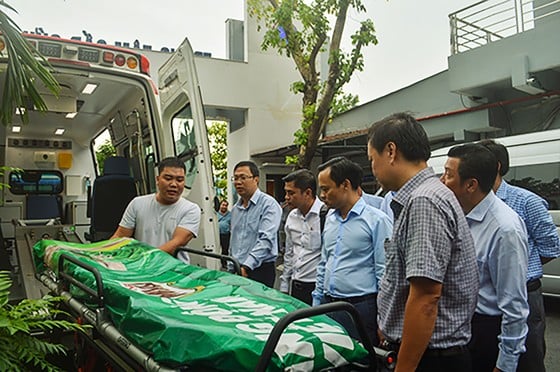SGGP
Recently, the Ho Chi Minh City health sector has signed a cooperation agreement on regional health development with the Southeast and Mekong Delta provinces to reduce the burden on the Ho Chi Minh City health system and provide better health care for people in the region. This cooperation contributes to building and developing a specialized health network, helping people access high-tech health care right in the locality.
 |
Can Tho City Department of Health delegation visited and learned about activities at the 115 Emergency Center in Ho Chi Minh City |
Share experiences, support transfer
Recently, in Ba Ria - Vung Tau province, representatives of the Ho Chi Minh City Department of Health and the health departments of the Southeast provinces (Ba Ria - Vung Tau, Dong Nai, Binh Duong, Binh Phuoc, Tay Ninh) signed a cooperation and development agreement. The units agreed on priority topics that need to be strengthened in connection, coordination, transfer and experience sharing, including: cooperation, support for technical transfer between general and specialized hospitals at the end of the Ho Chi Minh City area and provincial hospitals in the Southeast region; building a network of specialties from end-of-line hospitals in Ho Chi Minh City to provincial, district and grassroots health hospitals; strengthening connection and data exchange in epidemic prevention and control, industry management, etc.
In addition, the units also signed cooperation agreements in the field of preventive medicine to improve the effectiveness of epidemic prevention, specifically: establishing a channel to share information on the epidemic situation; conducting assessments of domestic and regional epidemic risks; monitoring agents of circulating epidemics and other dangerous epidemics; sharing expertise, techniques, good and creative models, and effectiveness in epidemic prevention work; providing support for epidemic prevention resources in emergency situations...
Previously, the Ho Chi Minh City Department of Health signed a cooperation and development agreement in the field of public health care from now until 2025 with the health departments of 13 provinces and cities in the Mekong Delta region (Can Tho City, Long An, Tien Giang, Hau Giang, Kien Giang, Vinh Long, Tra Vinh, Bac Lieu, Soc Trang, Ben Tre, Ca Mau, An Giang, Dong Thap).
Associate Professor, Dr. Tang Chi Thuong, Director of the Ho Chi Minh City Department of Health, said that the cooperation agreement was signed at two levels: bilateral cooperation between medical facilities (including technical transfer cooperation between end-line hospitals and local hospitals; professional cooperation between disease control centers of provinces and cities; cooperation in sharing experiences in state management between health departments) to meet the development needs of each unit and locality; at the same time, cooperation in building and developing a specialized medical network from end-line hospitals to grassroots medical facilities, from Ho Chi Minh City to provinces and cities in the Mekong Delta region.
Building a regional specialist network
According to Associate Professor, Dr. Tang Chi Thuong, the regional health project is being developed by the Ho Chi Minh City Department of Health to submit to the Ho Chi Minh City People's Committee for approval, with the goal of taking care of the health of people in the area. The department has currently requested hospitals in Ho Chi Minh City to change their awareness, which is to not only take care of the health of people in Ho Chi Minh City but also take care of the health of people in the Southeast and Mekong Delta regions.
“Every 6 months, localities will review and evaluate experiences to soon turn the cooperation plan into practical activities, aiming to reduce the load on end-line hospitals in Ho Chi Minh City and improve the quality of health care for people in the region. Because taking care of the provinces is taking care of Ho Chi Minh City itself,” Associate Professor, Dr. Tang Chi Thuong affirmed.
Also according to Associate Professor, Dr. Tang Chi Thuong, on the basis of successfully implementing many cardiovascular intervention techniques so that local people do not have to go to Ho Chi Minh City for treatment as before, it is expected that a specialized cardiovascular center with specialized techniques (from open heart surgery to interventional cardiology, electrophysiology, etc.) will soon be established at Soc Trang Provincial General Hospital, with comprehensive technical support from Ho Chi Minh City University of Medicine and Pharmacy Hospital.
In the future, hospitals in Ho Chi Minh City will transfer new techniques to provincial and city hospitals in the Mekong Delta and Southeast regions. After firmly developing specialized techniques, local hospitals will minimize transfers to Ho Chi Minh City.
Mr. Truong Van Hung, Director of the Department of Health of Tay Ninh province, said that the signing of the cooperation agreement on health development in the Southeast region is an opportunity for the health sector of provinces and cities in the region to access experience and knowledge in many fields, such as: health management, health cooperation, support, and exchange of experiences in effectively implementing the satellite clinic model. At the same time, it develops services in the public health system, builds a professional network of emergency care inside and outside the hospital, meeting the increasing health care needs of the people.
In the immediate future, the Ho Chi Minh City health sector will support 13 health departments of provinces and cities in the Mekong Delta region and 5 provinces in the Southeast region in technology transfer, human resource training, scientific research cooperation, experience sharing in grassroots health development, digital transformation in the health sector, state management in the private health sector, etc. The end-line specialized hospitals in Ho Chi Minh City are also urgently drafting plans to develop a regional-scale network of specialties, participating in the implementation of specialized techniques in each specialty, such as: obstetrics, pediatrics, oncology, neurology - stroke, cardiovascular intervention, neurosurgery - orthopedics, urology, etc.
Source


























![[Photo] Grassroots health creates breakthrough in primary health care for people](https://vstatic.vietnam.vn/vietnam/resource/IMAGE/2025/1/18/e7175df8da0745ef9ff609a077959eb2)



































Comment (0)